“Hurry and love are incompatible. Because love is incredibly time-consuming.”
John Mark Comer
Christians are supposed to be in the business of loving the broken, serving the downtrodden, and helping humanity flourish. So why are fewer and fewer of them giving charitably?
One could argue that it’s because love is incredibly time-consuming. And Christians are just too busy to care. They’re too busy to read emails. They’re too busy to read the mail. They’re too busy to Sabbath or get dressed for church when they can tune in online instead. They’re too busy to watch a video over 30 seconds long (but strangely not busy enough to binge-watch 6 hours of trashy TV on the weekend).
They’re too busy for God.
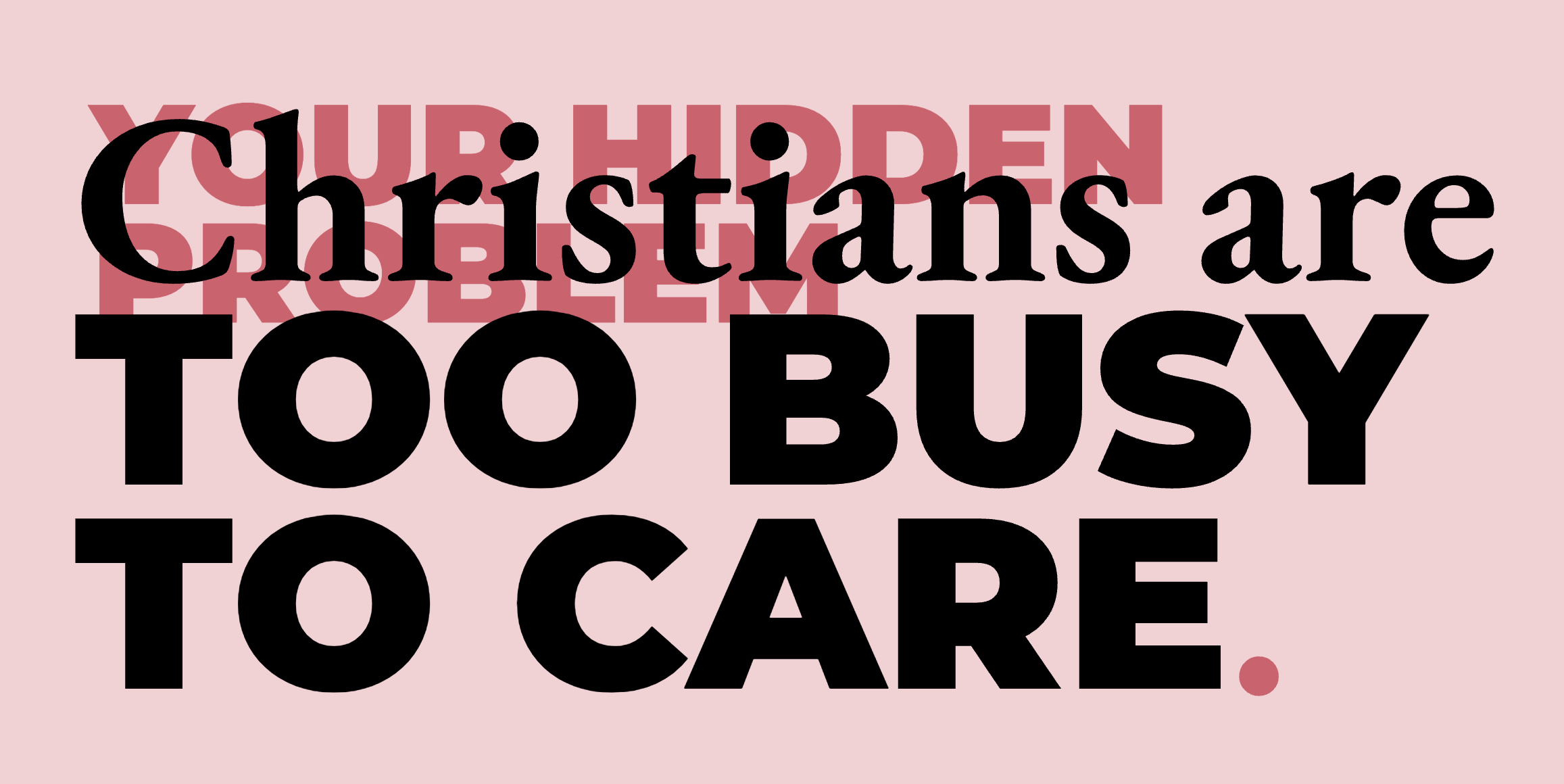
And why is this a problem for us?
Because you need to read the letter for it to break your heart. And you need to be quiet long enough to hear the Holy Spirit and respond to His prompting. And quite frankly, the world is ripping that capacity out of our hands.
In early 2007, Dr. Michael Zigarelli, Professor and Dean of Regent University School of Business, released a five-year study that collected data from over 20,000 Christians ranging from 15 to 88 across 139 countries, predominantly in the United States. In this study, they found this:
“Busyness and Hurry are the greatest obstacles to Spiritual growth and the biggest distractions from God and others.”
Obstacles for Spiritual Growth Survey — 2007
And here is the most tragic part of all of this. 2007 was the year the iPhone was released, and Facebook opened to the public. In 2007, we had a busyness problem. Has it gotten better since smartphones and social media have invaded our lives? No.
If you want to talk about distraction, the average middle-aged adult grabs their phone up to 2,617 a day.
According to the findings of the Obstacles for Growth Survey,
“the accelerated pace and activity level of the modern-day distracts us from God and separates us from the abundant, joyful, victorious life He desires for us. Ultimately it separates us from seeing God and seeing the needs of others.”
Dr. Zigarelli, after publishing this survey, postulated what he called the Vicious Cycle of Busyness. He put forth that it may be the case that:
- Christians are assimilating to a culture of busyness, hurry, and overload, which leads to
- God becoming more marginalized in their lives, which leads to
- a deteriorating relationship with God and others, which leads to
- becoming even more vulnerable to adopting secular assumptions about how to live, which leads to
- more conformity to a culture of busyness, hurry, and overload. And then the cycle begins again.
“If the devil can’t make you sin, he’ll make you busy.”
Corrie Ten Boom
Her logic is sound: both sin and busyness have the exact same effect—they cut off our connection to God, to other people, and even to our own souls.
If this cycle is true, then not only are we experiencing a collective deterioration of Christian relationships, but a more marginalized God in our society and an increased vulnerability to adopting secular worldviews.
This Vicious Cycle of Busyness and our current state of hyper-distraction are literally the worst environments for stirring up passionate supporters.
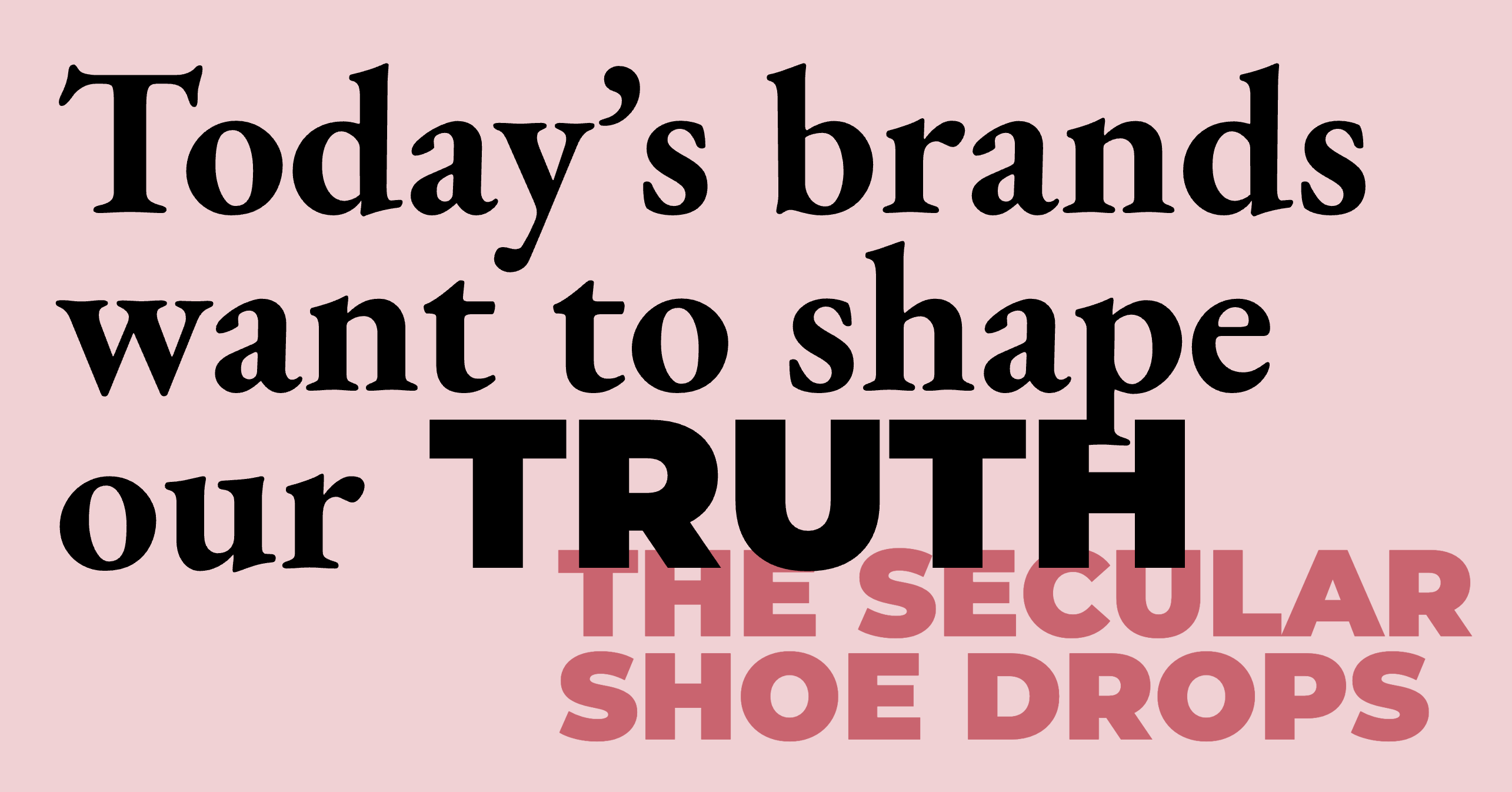
Suppose hurry marginalizes God and secular assumptions about how to live to begin to replace God. In that case, more and more Christians will become susceptible to having their core identities shaped more by the brands they wear, the political sides they choose, and the media they consume than by Christ and God’s word.
Perfect for secular brands. Challenging for Christian nonprofits.
Alan Noble, author of Disruptive Witness, argues that the biggest danger of our “secular age” is that Christianity has become a personal preference, an option among many accepted options. By this, he doesn’t mean that most people are atheists, but instead that religious beliefs, including Christianity, are no longer the default position but are actively contended and have to be chosen.
Today, people vet their religious affiliation based first on whether it will help them flourish. So if Christianity does not instantly lead to flourishing, i.e., if Christianity leads to suffering, then people can rightly say that it simply doesn’t work for them and leave it at that.
This same secular mindset and patterning is happening within Christianity itself. Denomination choices, preaching styles, non-profit causes, and “Christian” brand preferences are evaluated first by whether they are personally beneficial. Just look at the trend over the last five years within sustainer programs—more and more, nonprofits are putting more emphasis on donor benefits and virtue signaling than missional benefits. This is part of the Vicious Cycle of Busyness that makes us increasingly vulnerable to these secular assumptions on how to live and have a sense of personal fulfillment.
Busy people follow brands they like because they add to their system of “my truth” thin beliefs.
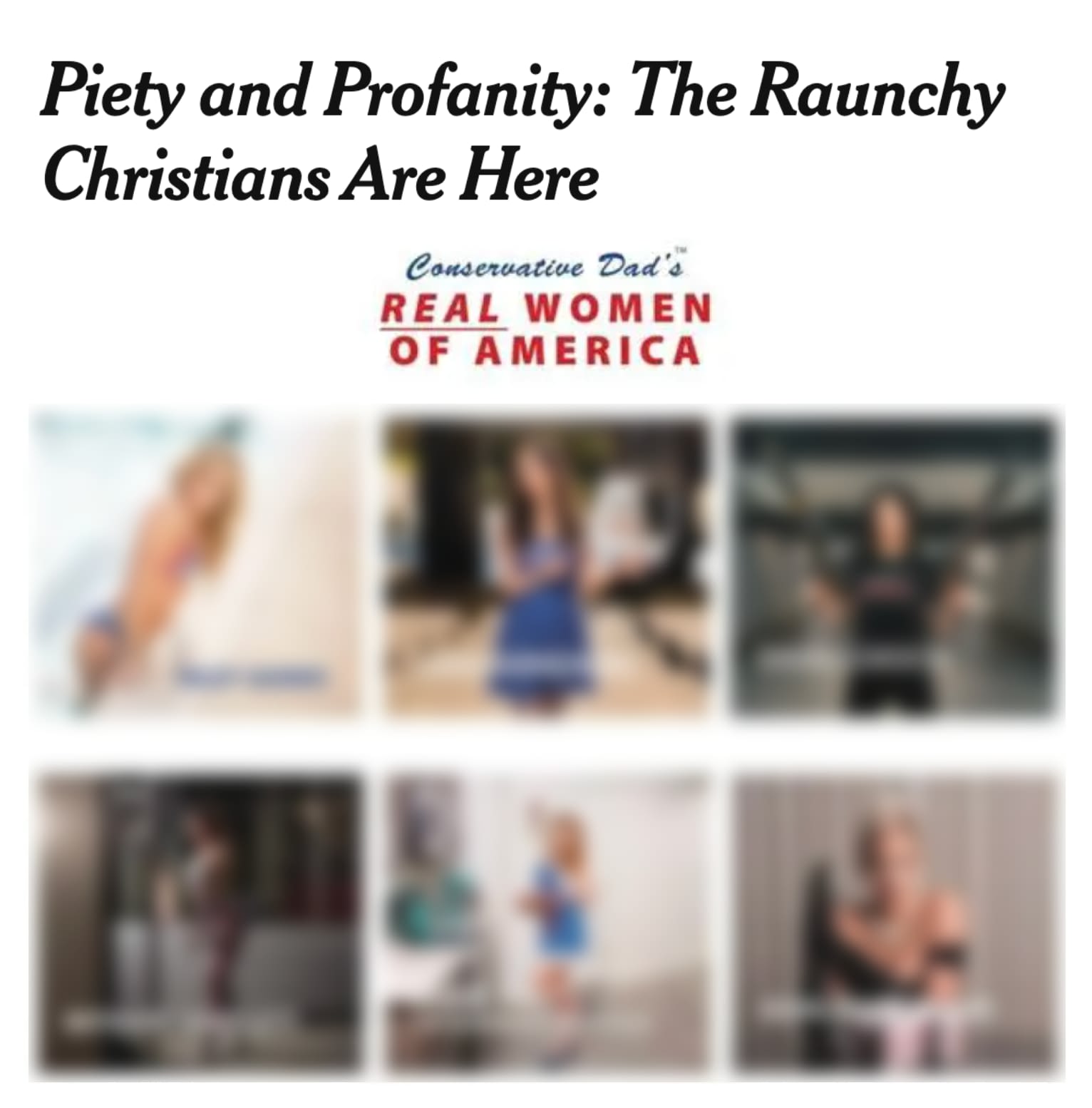
Another consequence of our secular age Noble explores is the phenomena of “thin belief.” By this, he means strong beliefs that many people hold about the world that lack robust explanatory power.
In our digital age, we are pressured by our peers and even strangers on the internet to take positions on issues that are way more complex than many of us realize and that we don’t have strong justifications for if one were to ask a simple set of questions. This can range from immigration and refugee policy to criminal justice reform and global warming, to homelessness and the state of Israel, and imperialist perceptions on evangelism. What’s important is not how well we understand these issues but how we take a stand and align ourselves with a particular group on a particular issue to express our identities.
This isn’t just a “woke” thing. Many Conservative “Christians” have stitched together an identity based on a cultural Christianity more than a biblical one. These identities are formed by conservative brands, politicians, influencers, news publications, etc., all based primarily on prioritizing personal security and safety, what is in it for my family and me, loving for my neighbor who looks like me, etc.
The New York Times recently published an article called Piety and Profanity: The Raunchy Christians Are Here, which began by citing a recent calendar that was released by a “woke-free beer” called the “Conservative Dad’s Real Women of America” calendar (see below). It featured old-school pinup images, including famous conservative Christian women in bikinis and bubble baths. One image features a crucifix hanging prominently on the kitchen wall behind a woman in a tiny skirt, apron, and platform heels.
Here’s the most profound part of the article:
“Well into the 21st century, conservative evangelicals maintained their reputation for strict standards within their churches and schools around language and public displays of sexuality.
There was a widespread agreement that the Bible was clear on these matters. “Do not let any unwholesome talk come out of your mouths,” the Apostle Paul wrote in the New Testament book of Ephesians. And elsewhere: “Flee from sexual immorality” and “abstain from all appearance of evil.”
But for some conservative Christians, the stakes of the moment are now high enough that a certain amount of vulgarity is not just tolerated but also required as “a form of truth-telling” worthy of the prophets.”
New York Times
Did you get that? Vulgarity and sexual explicitness—declared as Christian truth-telling. Even if this article is politically biased (which it is), its very presence and critique are troubling.
For many Christians today (ask any Pastor anywhere), it is more important to be [insert political opinion] than it is to be Loving, Non-Violent, Humbly Charitable [insert any attribute commanded by Jesus in the Sermon on the Mount].
Noble is not suggesting that this rise in thin beliefs is a consequence of atheism or that other religious communities don’t have thin beliefs. Instead, he argues that modernity and technology, more broadly, have pushed us towards these thin beliefs by making the importance of self-expression more important. What happens then is those issues become our identity and our expression of Christianity rather than Christ himself because technology and algorithms have backed us into a corner of enemy and ally.
We have a choice as to whether we want to make things better or make things worse.
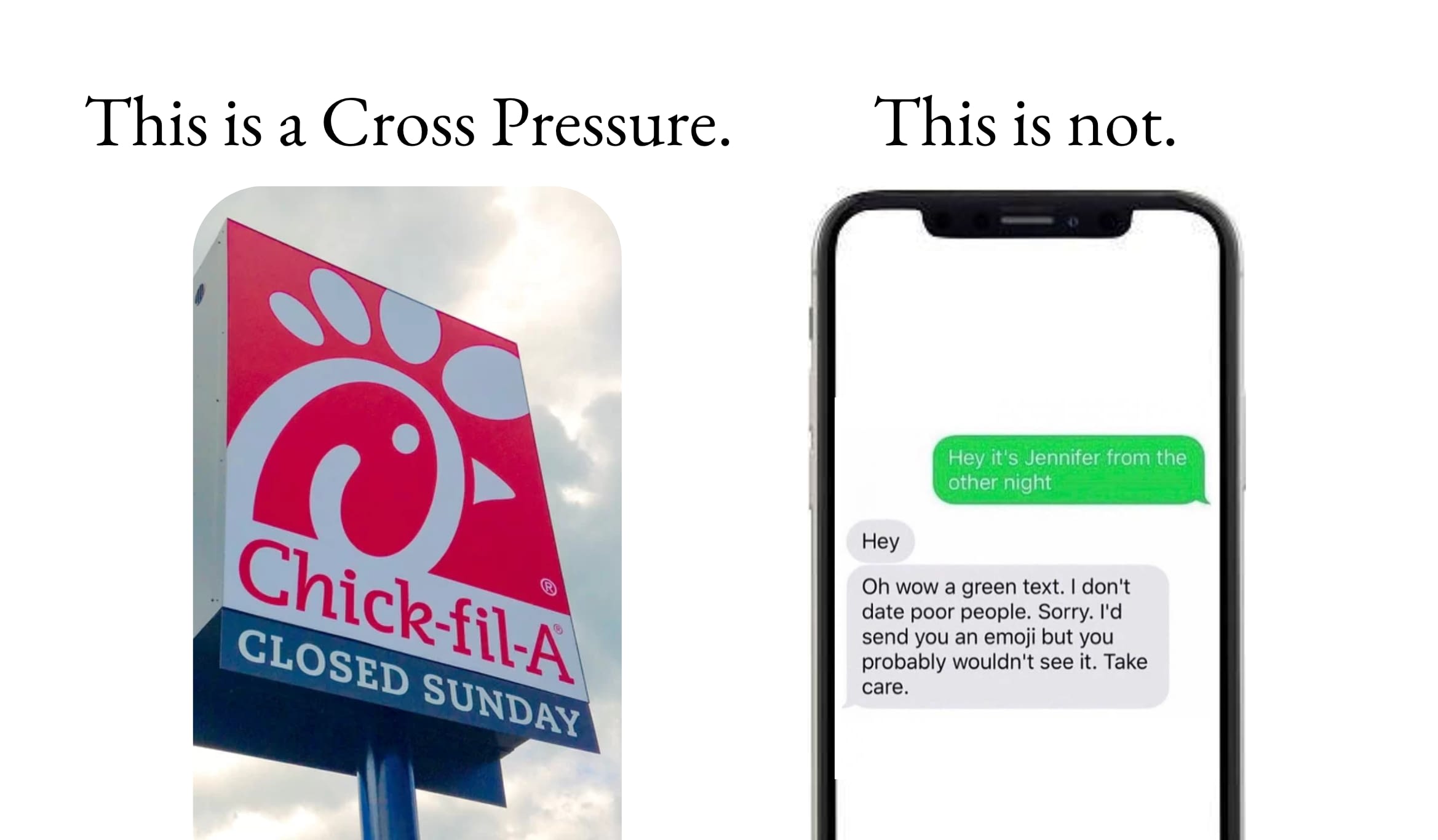
In the for-profit world, we can hold up Chick-fil-A and Apple. Both are highly relevant and resonant as brands. One is a great example of an organization that rallies against the Vicious Cycle of Busyness to point us to a greater Truth and one that leans into the Vicious Cycle of Busyness to shape our identities and truths toward its greatness.
Chick-fil-A is famously closed on Sundays. It makes ZERO business sense. At face value, they are losing a ton of money to their bottom line by doing this. One might say that this is BAD stewardship. This is often mocked in the larger marketing landscape or even preyed upon by competitors. Popeye’s often puts “OPEN SUNDAYS” on their signs if they are close to a Chick-fil-A.
Apple, on the other hand? The image above is probably the most famous meme, representing the “Blue Bubble vs. green Bubble” polarization that Apple designed into its software.
For those who don’t know, if you own an iPhone, a fellow iPhone user’s text appears in blue, and an Android user’s text appears in green. This design choice has formed Apple users in a way that they judge people who don’t own an iPhone. Through software, they created a caste system to inflate the identities of their users at the expense of others.
If you look at how the Caste system plays out in India, that is exactly what Apple has done.
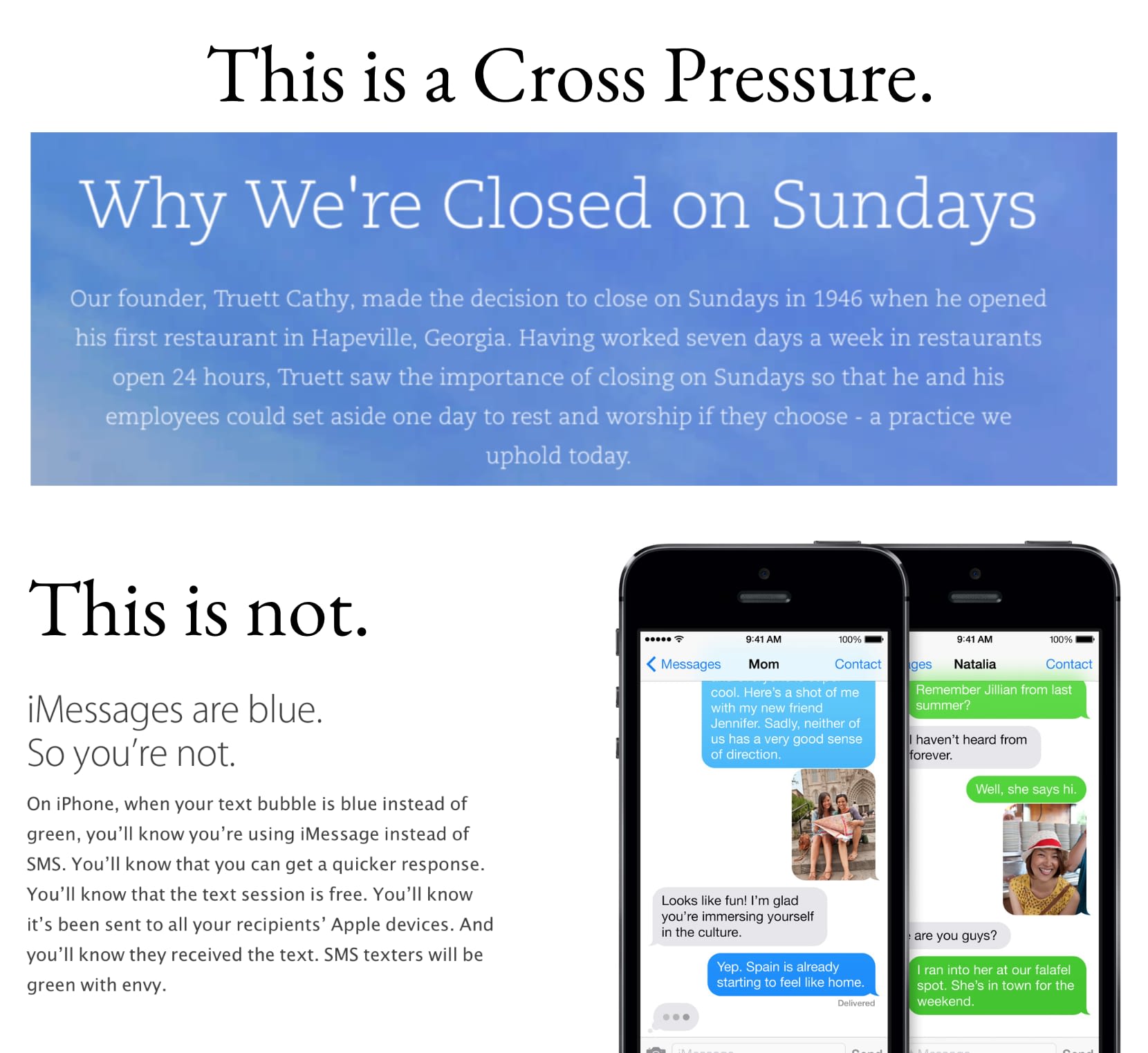
Why is Chick-fil-A closed on a Sunday? Because their founder and leadership understand that honoring God is more important than their bottom line. And this doesn’t just show up on Sundays. This is everywhere, from employee benefits to customer service to corporate responsibility.
The world is telling us we must always be “On.” Always in our constituents’ inboxes, on their Facebook feeds, always asking, asking, asking. Have we ever stopped to ask what that signals to our donors and supporters?
It signals, for example, that they don’t have to rest. They need to be always on, always on their Facebook feeds, always responding, responding, responding. Always busy.
Perhaps Chick-fil-A knows that busyness is the number one problem with Christianity today. When someone I drive by a Chick-fil-A on a Sunday and see that it’s closed, perhaps that signals something more important than taking my 15 bucks.
Is it costly to have to wait a day to get my Chicken? It is costly for my patience and need for instant gratification, but it is worth it. Is it Costly for Chick-fil-A to be closed on Sundays? It is costly for their bottom line and shareholder profits, but it is worth it.
And then there’s Apple.
Doing the exact opposite. Always there, always elevating themselves and making me feel like the center of the universe, with my blue bubble, while all those SMS texters are “green” with envy.
I may even go into debt to get the latest iPhone and Apple Watch Combo; I want to get that fancy iPad for my kid because heaven forbid they show up at school with a Kindle Fire.
Yes, Apple makes GREAT products that are easy and intuitive.
But make no mistake—they are one of the biggest companies in the world because they aim for Godhood, for cult-like followers who want to shape their identities, get addicted to their devices, and get stuck in their orbit, where the price for exiting is higher than staying in it.
A brilliant business strategy that kindles Brand Passion, but not in a way that helps people slow down enough to care about anyone but themselves.
As a faith-based nonprofit, you now have to live in this world where your audiences increasingly ask, “What’s in it for me?” “Is this “my flavor” of Christianity?” and ” What “side” does this put me on?”
So what do we do?
The unfortunate reality is that most Christians throughout Church history have always just gone with the flow. Pre-reformation, most Christians were fine with buying indulgences to pay off time in purgatory because they didn’t know any better. Most Christians owned slaves before slavery was abolished because they didn’t know any better. And today, most Christians are fully sucked into a digitally addicted, distracted, and my-truth-twisted worldview because they don’t know any better.
But this is why being a Brand is important to changing this reality. As John-Mark Comer explains in his latest book, Practicing the Way,
“Everything is Spiritual Formation, everything forms our spirit and core identity, from what we buy to what we watch to what we read and hear.”
Brands are MASSIVE spiritual formers because they culminate formative intersections with people. They are influencers, solutions providers, and lifestyles. Almost everything you read or hear about online today was delivered by a brand.
It is no coincidence that the U.S. government spends more time asking brands like Meta, Google, TikTok, and X to solve digital problems than it does itself because the power is in the hands of the platforms and the brands on them. The United States is currently trying to force TikTok to sell its company for fear of its power to subtly form US citizens in the image of “communist China.” That is the power of a Brand.
Anxiety, loneliness, polarization, depression, gender crises, and the dissolution of absolute truth are all at extreme levels; why? Because of problems created by—and manipulated by—brands & technology platforms for profit.
So, as a brand, as the Parachurch, you are in the most influential place to influence Christians back toward the cross, back to the capital C church. History has told us time and time again that the majority is not going to do it themselves.
This is why prominent voices like John-Mark Comer, who is doing an excellent job of rallying young Christians back to the way of Jesus in partnership with the local Church, are doing it through a Brand. It’s not John Mark anymore; it’s a nonprofit called Practicing the Way.
If you want to build passionate supporters, you will need powerful brand relevance that can cut through the world’s noise and unbelievable Kingdom resonance to get them to slow down enough to care.
Feeling a bit hopeless or overwhelmed? There’s a light at the end of the tunnel.
Getting passionate supporters is not only possible but essential.
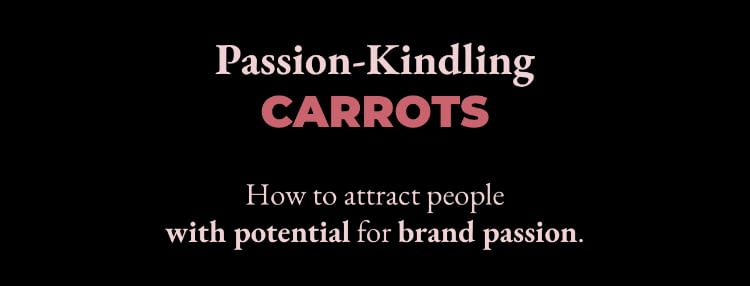
The first thing you need to focus on is being distinctive enough to get their attention, even when busy and distracted.
These are things you can dangle in front of people to get their attention, even while they are in that state of busyness and distraction.
The goal of these carrots is to attract people who could be passionate about you and your cause. This doesn’t guarantee passion, but getting these elements into your brand experiences can be a great place to start.
5 ‘R’ questions you should be asking to find ways to be a distinctive brand and stand out above the noise:
Are you Relevant?
Can I identify with you in terms of my interests and values? You aren’t going to attract people who don’t share your values. Don’t bother. But is this where you are starting? Are you starting your relationship with alignment?
If I don’t identify with you, I won’t likely trust you.
Also, are you relevant enough?
Outside of a values alignment, are those values motivating in today’s landscape right here, right now, and where I am? I may align with your values, but I still do not feel I need to engage in any way.
Don’t confuse trust with relevance. I trust my parents completely, but when it comes to issues in schools facing my kids today, they aren’t relevant. You need to be both trusted and relevant.
Are you Resonant?
Is there a benefit being demonstrated that makes me see myself in a specific light that creates a sense of purpose? This isn’t about core identity; this is about attributes. Do I see myself as being kind, compassionate, or a difference-marker? More Christ-honoring or Loving my Enemies? Etc.
Also, are you resonant enough?
Are you doing more than I expected? Are you MORE than a charity? Am I surprised and delighted and even challenged the deeper I get? What do you do differently than others in your category?
Greater distinction can lead to greater resonance, but distinction without relevance is just another distraction.
Are you Relational?
Can I rub shoulders with the tribe if I so desire? Can I find and engage with others like me within your “walls”?
The Bible Project has monthly giving Patrons. However, it is careful to avoid referring to its patrons as a specific community because, as its previous head of marketing told me, “you can’t have community if you don’t know or can talk to each other.”
There ARE ways to have a community online and in relationships. Just make sure you aren’t thinking being a part of the same thing is the same as being able to find and engage with other people.
Also, are you relational enough?
Do I know someone at your organization by name, and do they authentically know me by name?
This one is important. Brands can often feel faceless. Focusing on real relationships—and it doesn’t have to be with the president; it could be a 1:1 relationship with a receptionist or the blog writer—creates a bonding link that is much harder to break.
For one client, we had them call just ten donors to ask a few questions. From that simple exercise, they learned more about ALL their donors, and it also increased their engagement with those donors. When was the last time you, or anyone else, had a conversation with ten donors who weren’t in your call center?
Are you Reliable?
Is your brand consistent? Am I, as a donor, being acquired on one thing only to find you talking about something different right away? Is everyone at your org communicating the same thing and providing the same experience?
Want to undermine trust and relevance super fast? Be inconsistent.
Also, are you reliable enough?
Are you being truthful to your donors? Can you do what you promise? Are you delivering on it?
There’s a difference between being honest and being honorable. Be the latter.
Are you Riveting?
People like to cheer for a winning team.
This is key because you can’t just say that you are winning; it must be felt and experienced.
For example, saying you are ending homelessness while more and more people are homeless every year does not feel like winning — even if you are changing more lives every year, too.
You need to find an authentic way to win that “feels” like winning to your audience, too.
The one thing major donors, in a study, valued most about the orgs they invested in was momentum.
Also, are you riveting enough?
Is there only one way to go deeper with the organization, or are you providing ample ways to deepen my relationship with you?
If you only talk to me like I’m a donor, regardless of what choices I could make, then I will only think I am useful as a donor.
Choice is a powerful tool, and so is an invitation to be more by offering more options for engagement.
Donate (in multiple ways), volunteer, buy merch, become a member, tell others, visit, take a tour (in person or virtual), get a surprising resource that benefits the donor, etc.
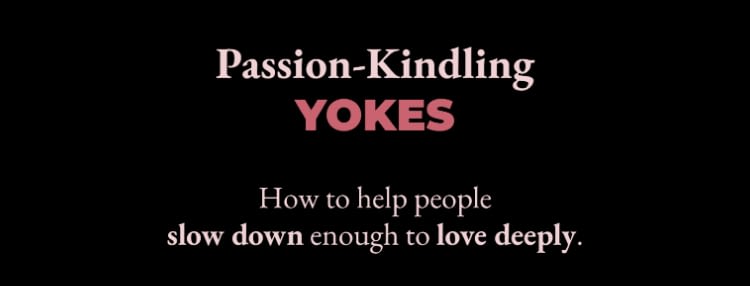
Next, you must focus on being disruptive enough to get them to slow down and care despite their busy and distracted lives.
These are things that get people to slow down to Jesus’ pace of life so they can love as He loved. After all, His Yoke is easy, and His Burden is light.
This is the biggest challenge you will face. Being Relevant & Resonant as a brand in our rapidly changing world means confronting, navigating, and solving for the very environment in which we live.
7 types of yokes you, as a brand, can directly influence in helping your supporters slow down.
Create Cross Pressures
By this I mean, put on the pressure of God’s Kingdom here and now. Remind people that we are invited into God’s truth and God’s rhythms for the good life. Remind them that they are not their own; they belong to God, their creator, whether they want to believe it or not. That is Good News!
Think about how your brand shows up with a biblical worldview, even in the choices you make and the tactics you use in your marketing.
Are you manipulating emotions, or are you inviting people to listen to the Holy Spirit?
When Jesus said, “But when you give to the needy, do not let your left hand know what your right hand is doing, so that your giving may be in secret,” — what could that mean for your donors? Are you leveraging Virtue Signalling to boost your response or wrestling with how to let humility drive your donor journeys?
Focus on Captive and Relational Spaces
For-profit brands are even trending toward this: they have all realized that spaces like Facebook are too noisy to be reliable anymore for creating passionate users.
Pardon my language here, but the official word of the year in 2023 was Enshittification — which describes how bad and malicious platforms like Facebook, TikTok, Amazon, and X have gotten, not just for users but even for advertisers too, for the sake of Shareholders and profit.
They are all wrestling with how to own their communities and data and build relational spaces. This should be our focus, too.
We need to start motivating people to stop consuming “theologically thin” and temporarily triggering content and make it worth their while to be in authentically relational and interactive spaces.
Start thinking about how you might better leverage phone calls, chat rooms and forums, webinars and town halls, podcasts, Patreons, prayer vigils, big events, and even localized meetups to get people to engage in real-time and for longer periods that reward that investment.
Platform popularity is not your friend in this. Even Substack, which was hailed as long-form content’s saving grace, has already grown too bloated to be an effective enough space.
Reward Engagement with Time-Consuming Content
Optimizing content for 30 seconds is not going to get people to care. It will get them to, at best, be impulsive and then move on.
While we need the carrots that can bring them in, your focus should be on incentivizing them to engage with time-consuming content. This is not about the content; this is about the reward. Brand Passion is kindled when something is costly (i.e., time-consuming) but worth it.
Inspire Sacrifice
Love is costly. An easy and light Yoke is still a Yoke, but it is life-giving.
People need to be inspired to get out of themselves. They want to do it, but the cost will require inspiration.
I am DYING for a non-profit to test a theory I got based on the book Alchemy by Rory Sutherland.
Over the last five years, pretty much every nonprofit has worked really hard to spin up a monthly sustainer program—primarily for their own internal financial reasons—not really asking if that was the right thing to do for donors but hopping on a trend because of COVID, Netflix, etc. There’s a part of me that wonders if we have traded an automatic deposit of money at the expense of an active relationship with a donor.
I’m starting to see a trend with some clients: Their monthly donors are starting to be some of their least engaged users—they’re even ignoring all of their “unique/exclusive benefits.”
So I start to ask, if my donations are being automatically withdrawn, does that make me automatically withdraw? At what point have I fully lost all reason for giving to an organization that when a new shiny cause comes along, I know exactly where I can transfer my donation?
So here’s a test idea, and PLEASE, somebody, try it and tell me if it works: find a way for someone to have to click a donate button every month for their automatic donation to go through. It’s super counterintuitive, but so are humans. I truly wonder if having to actively donate every month will do a better job of kindling passion in our most faithful donors than the partial hope that they will set it and forget it.
Remind Donors and Supporters of Their First Love
We need to constantly remind donors why they signed up in the first place.
Often, we do this by telling stories of impact laced with an ask. However, a story with an ask does not remind them of their first love; it reminds them of their first response.
Also very important here is that the first love is often the cause, not the organization. It’s a vision of a future, not an outcome of a program. Remind them of the cause behind the brand, not your brand.
Every Marriage Counselor will tell you that you must date your spouse, not remarry your spouse. There’s a difference between retaking your vows and going out on a date to learn something new about a person you already know well.
Do Less with More
Focus on a few things first, and put more energy into it. If you want to succeed in Meta, hire someone to respond authentically to every single comment (good or bad) anyone makes. To play the algorithm game, you need to engage one-on-one. If you want to talk to a brand succeeding at this on Meta, talk to Donna Lucas at Joni & Friends.
The point is that you are also too busy to do it all, so stop trying. Start small, learn what kindles passion for your audience, and do it well in a few places first.
Remember, Your Future is in Your Hands
Do not wait for someone else to figure out how to get your audience to slow down enough to care again. You can’t afford to wait.
If you are seeing diminishing returns, if your tactics aren’t working as well as they used to, stop and ask yourself if it is an optimization problem or a larger landscape problem. Your brand can influence the Christian body and can kindle passionate donors.
But the road to that is not a direct-response-primary road—the world around you is far too busy and too distracted to respond directly like it used to.
A theory for why direct mail is starting to lose efficacy, even in cultivation, is that the oldest donors were the last to fully embrace their smartphones. But because of COVID, they too are now too busy scrolling through Facebook to care enough to read a letter.
If you don’t shape your supporters, other brands will.
In today’s rapidly changing world, brands have more power than ever to form people.
Here’s to embracing this power and shaping a world that’s less distracted, more connected, less busy, and more loving.












